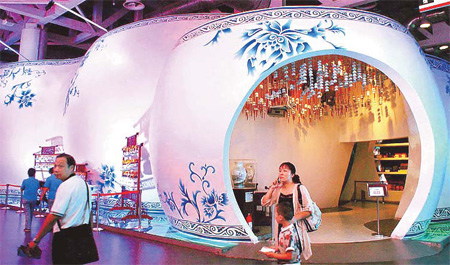A new world beckons
'Seeing is believing'
In a country when two-thirds of the populations still living in rural areas, 2010 Expo Shanghai has lured many villagers out of their comfort zones to learn more about the wide and wonderful world around them.
Moreover, with China's ongoing urbanization, with more remote suburbs rapidly being developed into satellite towns, the world's fair potentially offered valuable experience in modernization.
After a steady diet of expo-related news on television and in the newspapers, Du Chunting and 29 friends from Dazhen village, Hebei province, decided to witness it for themselves.
"Seeing is believing," said Du, who rode for 15 hours in a coach to reach the Expo Garden. "We need to see what changes are taking place around the world and what China has to offer.
"We also want to know the distance between China's rural and urban areas and between us and the world, as well as the problems we may face during development," he added.
More than 10,000 farmers from Yonglian village, Jiangsu province, also visited the event last month for "an eye-opening experience" that they hoped would offer inspiration for the future.
Despite the wide gap between the countryside and the cities, rural areas in China have undergone huge changes in recent years. Almost 70 percent of the residents in Wushi village own mobile phones, said Huang, who explained that incomes have increased substantially in his village as the central government has stepped up support for agriculture and more farmers have found part-time jobs or become migrant workers in cities.
However, the growth in earnings has come at a price: the environment. Huang's part-time job with the water resources bureau involves cleaning the county's waterways, which have been seriously polluted by increasing domestic sewage in villages.
"It goes against the idea that the expo is trying to tell us: to pursue a low-carbon and environmentally friendly way of life," said the farmer. "People need to be educated about that more."
After spending three days in a city, Huang also knows that urban areas also have challenges to overcome.
"The theme of 2010 Expo Shanghai was 'Better City, Better Life'," he said, "but it seems cities have far more problems than (villages) do. There are too many cars, the air is not as good as in the countryside and the food is unnecessarily expensive."
 |
| Visitors walk past a large display at the pavilion for Jiangxi province, which highlighted its rich history in porcelain production. The province boasts a production base in the city of Jingdezhen. [China Daily] |
An average meal at the Expo Garden cost 40 yuan, equal to 25 kilogram's rice in Huang's village, which could sustain him for an entire month.
The farmer said he also felt extremely uncomfortable sleeping in an air-conditioned hotel room as he is used to "the natural air back home". He added: "I saw many times at the expo people being encouraged to use less electricity, so why do they use so many electrical appliances?"
 0
0 






